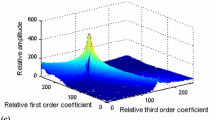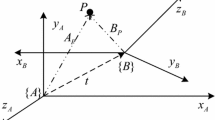Abstract
Traditional inverse synthetic aperture radar (ISAR) imaging algorithms can not obtain focused images when the target undergoes complex three-dimensional (3D) rotation. An imaging algorithm to obtain two dimensional (2D) images or 3D distributions of scattering centers is proposed in this paper for targets undergoing complex rotation in a small angular extent. Firstly, the phase histories of different scattering centers are extracted by signal decomposition and they are arranged into a phase history matrix. Then, the singular value decomposition is carried out for the phase matrix to reveal the rotation characters. 3D rotations and 2D rotations are identified from the singular values and these two cases are treated separately. When target undergoes 2D rotation, the focused ISAR image can be obtained by resampling the received signals according to the first column of the right singular matrix. When target undergoes 3D rotation, the distorted 3D scattering center model can be obtained directly from the first and second columns of the left singular matrix. The distortion and ambiguity for the extracted 3D scattering center model are also analyzed theoretically. Simulations and experimental results verify the effectiveness of the algorithm.
Similar content being viewed by others
Explore related subjects
Discover the latest articles, news and stories from top researchers in related subjects.References
Bai X., Xing M., Zhou F., Bao Z. (2009) High-resolution three-dimensional imaging of spinning space debris. IEEE Trasactions on Geoscience and Remote Sensing 47(7): 2352–2362
Bao Z., Sun C., Xing M. (2001) Time-frequency approaches to ISAR imaging of maneuvering targets and their limitations. IEEE Transactions on Aerospace and Electronic Systems 37(3): 1091–1099
Burrows M. L. (2004) Two-dimensional ESPRIT with tracking for radar imaging and feature extraction. IEEE Transactions on AP 52(2): 524–532
Chen V. C., Ling H. (2002) Time-frequency transforms for radar imaging and signal analysis. Artech House, Boston, London
Chen V. C., Miceli W. J. (1998) Time-varying spectral analysis for radar imaging of manoeuvring tragets. IEE Proceedings—Radar, Sonar and Navigation 145(5): 262–268
Chen V. C., Miceli W. J. (2001) Simulation of ISAR imaging of moving targets. IEE Proceedings—Radar, Sonar and Navigation 148(3): 160–166
Cooke, T. (2003a) Ship 3D model estimation from an ISAR image sequence. In International radar conference (pp. 36–41).
Cooke, T. (2003b) Scatterer labeling estimation for 3D Model reconstruction from an ISAR image sequence. In International radar conference (pp. 315–320).
Cooke T., Martorella M., Haywood B., Gibbins D. (2006) Use of 3D ship scatterer models from ISAR image sequences for target recongnition. Digital Signal Processing 16: 523–532
Ferrara M., Arnold G., Stuff M. (2009) Shape and motion reconstruction from 3D-to-1D orthographically projected data via object-image relations. IEEE Transactions on Patter Analysis and Machine Intelligence 31(10): 1906–1912
Jianxiong Z., Hongzh ong Z., Zhiguang S., Qiang F. (2008) Global scattering center model extraction of radar targets based on wideband measurements. IEEE Transactions on Antennas and Propagation 56(7): 2051–2060
Li J. F., Ling H., Chen V. C. (2003) An algorithm to detect the presence of 3D target. Multi-dimensional Systems and Signal Processing, Special Issue on Radar and Signal Processing and its Applications 14(1): 223–240
Nel, W., Stanton, D., Yunus, M., & Gaffar, A. (2009). Detecting 3D rotational motion and extracting target information from the principal component analysis of scatterer range histories. In International radar conference-surveillance for a Safer World, Bordeaux(Rance) (pp. 1–6).
Rice F., Cooke T., Gibbins D. (2006) Model based ISAR ship classification. Digital Signal Processing 16: 628–637
Stuff M. A., Sanchez P., Biancalanna M. (2003) Extraction of three-dimensional motion and geometric invariants from range dependent signals. Multidimensional Systems and Signal Processing 14: 161–181
Suwa K., Wakayama T., Iwamoto M. (2011) Three-dimensional target geometry and target motion estimation method using multistatic ISAR movies and its performance. IEEE Transaction on Geoscience and Remote Sensing 49(6): 2361–2373
Thayaparan, T., & Brinkman, W. (2006). 3D motion model and detection method for ISAR imaging. In International radar symposium (pp. 1–4), Krakow (Poland).
Thayaparan T., Stankovic L. J., Wernik C., Dakovic M. (2008) Real-time motion compensation, image formation and image enhancement of moving targets in ISAR and SAR using S-method based approach. IET Signal Process 2(03): 247–264
Wahl D. E., Eichel P. H., Ghiglia D. C., Jakowatz C. V. Jr. (1994) Phase gradient autofocus—A robust tool for high resolution SAR phase correction. IEEE Transactions on Aerospace and Electronic Systems 30(3): 827–835
Wang Y., Jiang Y. (2010a) ISAR imaging for three-dimensional rotation targets based on adaptive Chirplet decomposition. Multidimensional Systems and Signal Processing 21(1): 59–71
Wang Y., Jiang Y. (2010b) New approach for ISAR imaging of ship target with 3D rotation. Multidimensional Systems and Signal Processing 21(4): 301–318
Wang Q., Xing M., Lu G., Bao Z. (2008) High-resolution three-dimensional radar imaging for rapidly spinning targets. IEEE Transactions on Geoscience and Remote Sensing 46(1): 22–30
Wehner, D. R. (1987). High resolution radar. Artech House, Boston (pp. 273–334).
Yau, D., Berry, P. E., & Haywood, B. (2006). Eigenspace-based motion compensation for ISAR target imaging. EURASIP Journal on Applied Signal Processing, 2006(90716), 1–9.
Zhou, J., Zhao, H., & Fu, Q. (2006). A Novel method for reconstructing three-dimensional scattering centers and its performance bounds. In 2006 CIE international conference on Radar, Shanghai, China.
Author information
Authors and Affiliations
Corresponding author
Rights and permissions
About this article
Cite this article
Sisan, H., Jianxiong, Z., Huining, Z. et al. Radar imaging for targets with complex rotation based on phase history decomposition. Multidim Syst Sign Process 25, 425–445 (2014). https://doi.org/10.1007/s11045-012-0206-3
Received:
Revised:
Accepted:
Published:
Issue Date:
DOI: https://doi.org/10.1007/s11045-012-0206-3




